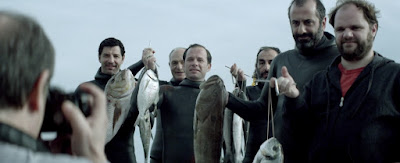 |
| source + |
From his earliest films to the recently acclaimed
The Past (which I disliked), director Asghar Farhadi has followed two existing traditions within Iranian cinema: the socially conscious realist family melodramas of the 1990s and the gritty street films of the 1970s. Though this has given his work a sense of familiarity for Iranian audiences, Farhadi has nevertheless stood out for his breathtakingly rigorous cinematic style. Outside of Iran, where these cinematic traditions are little known, Farhadi’s work appears even more audacious and captivating.
Farhadi gained widespread attention in his home country with the release of
Fireworks Wednesday, but his international breakthrough came with
A Separation. The latter also marked a shift in the way his audiences inside and outside Iran entered into dialogue. The Iranians, who had been generally apathetic to westerners’ regard for Abbas Kiarostami, suddenly started monitoring, through an almost systematic process of news updates and translations, all that was said and written about Farhadi abroad.
On the night of the Oscars in 2012, documented in
From Iran, A Separation (Kourosh Ataee, Azadeh Moussavi, 2013), millions of eyes in Iran were locked on TVs connected to illegal satellites, broadcasting the ceremony live, as if they were watching a national sporting match. Farhadi, as if aware of his sudden stature, turned the occasion into an opportunity for international conciliation in his acceptance speech. Since the live broadcast of the presidential election debates in Iran in 2009, this was the first collective viewing experience for the nation, a ceremony which was perceived as a dialogue between Iran and the US.
Asghar Farhadi: Life and Cinema (The Critical Press, 2014) is the first English book about the filmmaker, written by critic Tina Hassannia whom I interviewed recently for Fandor.











